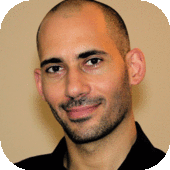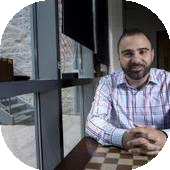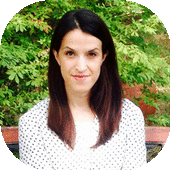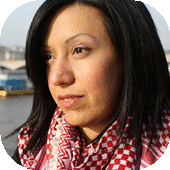Middle East Political Economy Summer Institute Network
SUMMER INSTITUTE PARTICIPANTS
2019 Workshop: Educators
Ziad Abu-Rish

Ziad Abu-Rish is Assistant Professor of History at Ohio University, where he also directs the Middle East and North Africa Studies Certificate Program. His research explores state formation, economic development, and popular mobilizations in the Middle East, with a particular focus on Lebanon and Jordan. He is co-editor of The Dawn of the Arab Uprisings: End of An Older Order? (2012) and Critical Voices: Interviews From and On the Middle East (2014). Abu-Rish serves on the editorial teams of both the Arab Studies Journal and Jadaliyya e-zine.
Samer Abboud

Samer Abboud is an Associate Professor of Global Interdisciplinary Studies at Villanova University. He has published extensively on contemporary Syria, including a widely read book on the conflict titled Syria (Polity, 2018).
Max Ajl

Max Ajl is a PhD candidate at Cornell University’s College of Agriculture and Life Sciences. Max has a background in rural-focused research with an emphasis on agrarian issues in Latin America (Brazil and Venezuela). His research interests are in agrarian political economy, developmental planning, and political ecology.
Max's current research focuses on the Tunisian experience of decolonization and post-colonial development planning, as well as southern theories of development as they played out in Tunisia and North Africa.
Max's current research focuses on the Tunisian experience of decolonization and post-colonial development planning, as well as southern theories of development as they played out in Tunisia and North Africa.
Julia Elyachar

Julia Elyachar is Associate Professor at Princeton University, and at the Princeton Institute for International and Regional Studies. She is an anthropologist broadly trained in economics, history of political and economic thought, political economy, social theory, Middle Eastern Studies, and Arabic language. Her research revolves around a set of problems at the intersection of political economy, social theory, and anthropology. Her primary research site is Egypt, where she studied and conducted ethnographic research for four and a half years in the 1990s, and where she continues to conduct research for shorter periods to this day. Her research is also informed by her work at the Federal Reserve Bank of New York and by my research experience in Israel/Palestine and former Yugoslavia, mainly in Slovenia.
Bassam Haddad

Bassam Haddad is Director of the Middle East and Islamic Studies Program and Associate Professor at the Schar School for Policy and Government and a core faculty member in the Philosophy, Politics, and Economics program at George Mason University. He is the author of Business Networks in Syria: The Political Economy of Authoritarian Resilience (Stanford University Press, 2011) and Co-Editor of Dawn of the Arab Uprisings: End of an Old Order? (Pluto Press, 2012). Bassam serves as Founding Editor of the Arab Studies Journal, a peer-reviewed research publication, and is co-producer/director of the award-winning documentary film, About Baghdad, and director of a critically acclaimed film series on Arabs and Terrorism, based on extensive field research/interviews. Bassam is Co-Founder/Editor of Jadaliyya Ezine and the Executive Director of the Arab Studies Institute, an umbrella for five organizations dealing with knowledge production on the Middle East. He serves on the Board of the Arab Council for the Social Sciences and is Executive Producer of Status Audio Magazine.
Muriam Haleh Davis

Muriam Haleh Davis is an assistant professor of history at the University of California, Santa Cruz. Her research interests focus on questions of political economy, racial classification, and postcolonial studies in Algeria. She is the coeditor, with Thomas Serres, of North Africa and the Making of Europe: Governance, Institutions and Culture (Bloomsbury Academic, 2018).
Adam Hanieh

Adam Hanieh is a Reader of Development Studies in SOAS. Prior to joining SOAS, Adam taught at Zayed University, United Arab Emirates. From 1997-2003, he worked in the NGO and public sectors in Ramallah, Palestine, where he completed an MA in Regional Studies at Al Quds University. He holds a PhD in Political Science from York University, Canada (2009). His research interests include political economy of the Middle East; labour migration; class and state formation in the Gulf Cooperation Council; Palestine. He is an international advisory board member for the journal Studies in Political Economy.
Shana Marshall

Shana Marshall is Associate Director of the Institute for Middle East Studies and Assistant Research Professor. Her dissertation, “The New Politics of Patronage: The Arms Trade and Clientelism in the Arab World” examined how Middle East governments use arms sales agreements to channel financial resources and economic privileges to pro-regime elites. Prior to GW, Dr. Marshall was a fellow at The Crown Center for Middle East Studies at Brandeis University and the Niehaus Center for Globalization and Governance at Princeton University. Her current research focuses on patterns of military entrepreneurship in Egypt, Jordan, and the UAE.
Pete Moore

Pete Moore is the M. A. Hanna Professor of Political Science; Associate Professor and Director of Undergraduate Studies in Political Science at Case Western Reserve University. His research interests focus on economic development and state-society relations in the Middle East and Africa; specifically, Gulf Arab States and Levant; business-state relations, privatization, and decentralization; sub-state conflict and regional security. Professor Moore currently serves on the Editorial Board of Middle East Report and is a member of the Northeast Ohio Consortium for Middle East Studies.
Kareem Rabie

Kareem Rabie is an Assistant Professor of Anthropology at American University in Washington, DC. He is completing his first book manuscript, "Palestine is Throwing a Party and the Whole World is Invited: Private Development and State Building in the Contemporary West Bank," in press with Duke University. Before joining the faculty at AU, Kareem was Harper-Schmidt Fellow and Collegiate Assistant Professor in the Social Sciences, as well as Lecturer in the Department of Anthropology at the University of Chicago. In 2014-15 Kareem was based at the University of Oxford where he was a senior Researcher and Marie Curie Fellow at the Centre on Migration, Policy, and Society; and Research Associate at the Oxford Programme on the Future of Cities. While at Oxford, he began research on the new economic geographies of Palestine/China trade.
Rafeef Ziadeh

Rafeef Ziadah is Lecturer in Comparative Politics of the Middle East. Her research interests are broadly concerned with the political economy of war and humanitarianism, racism and the security state, with a particular focus on the Middle East. Rafeef’s research has appeared in the International Journal of Urban and Regional Research, Environment and Planning D: Society and Space and Race and Class, among other venues. She is currently examining the impact of Gulf Cooperation Council military and commercial interventions following the 2011 Arab uprisings.


